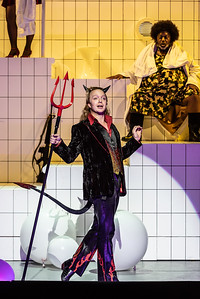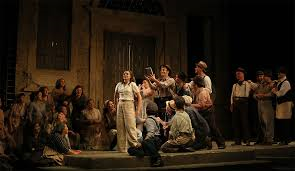London Coliseum, 8 November 2019
There will many of us who can still remember the Sadlers Wells Orpheus with Eric Shilling as Jupiter. It is not just an old man’s memory to say it still lives on in its froth and vitality – the very facets this new ENO staging seems to lack. Only Alex Otterburn’s wonderfully effusive Pluto comes anywhere near the enthusiasm and level of communication the work needs if it is to succeed. This is not to say it is poorly sung. Much of the musical side is fine with Mary Bevan a beautiful Eurydice and Alan Oke splendid in the small but essential role of John Styx. But Emma Rice’s staging tries too hard and seems to consistently miss the mark. The vast 1930s swimming pool set in the first half inhibits movement, reducing singers to constantly climbing up and down stairs, while the chorus mooch about in a straight line across the front. Any sense of character development or relationship is only primitively sketched in. The newly adapted text is often quite witty, particularly in the hands of Alex Otterburn, but the approach fails to hang together to create of pleasing whole.
Stalwarts of the quality of Willard White, Anne-Marie Owens and Judith Howarth are wasted when they are given so little to do, or what they do do seems inappropriate. Unusually, Sian Edwards conducting seemed often on the pedestrian side where it could have been uplifting. It was not simply the tempi, which were fine, but a lack of dynamism.
Now midway through the Orpheus cycle we have had one dubious and one disappointment. Let us hope the Birtwhistle and Glass can make up for it.


